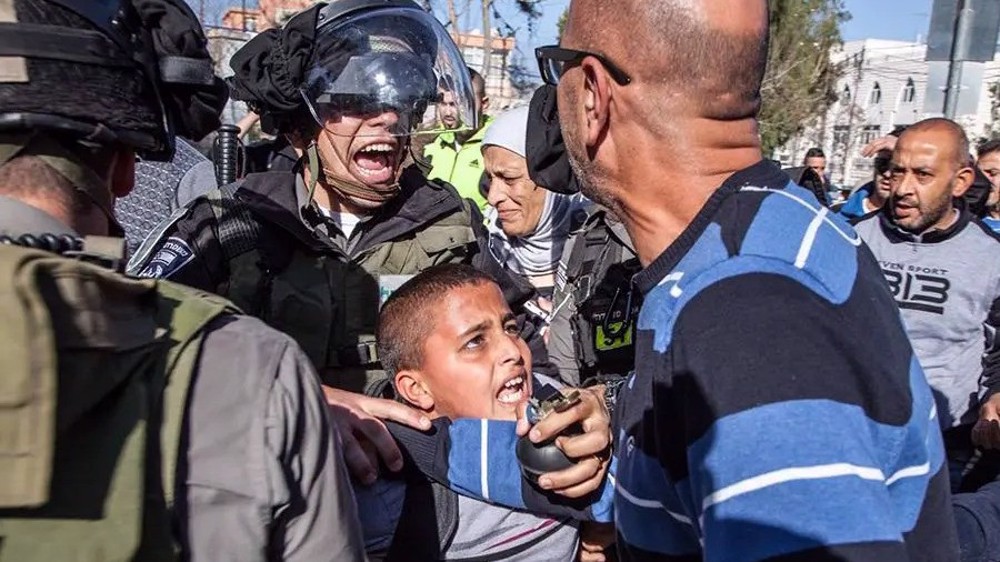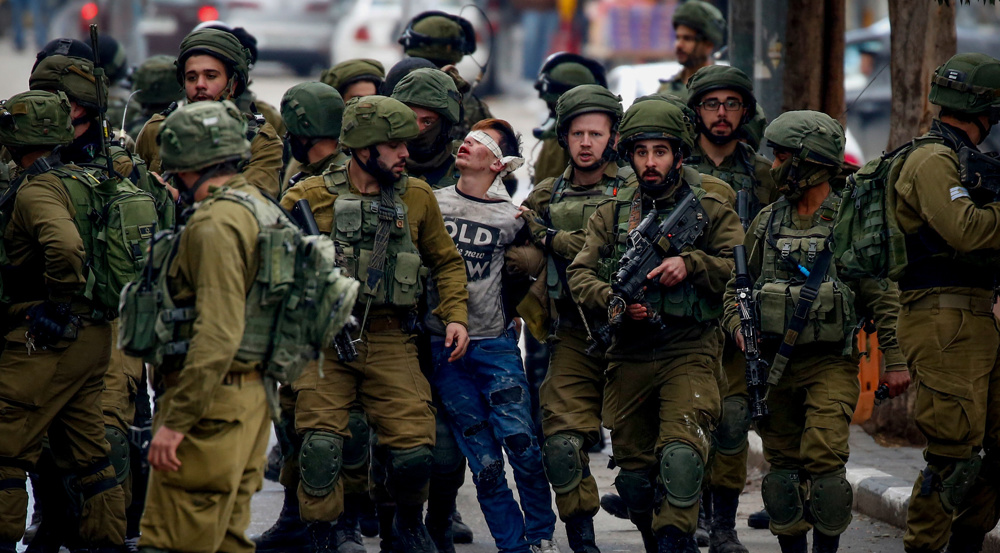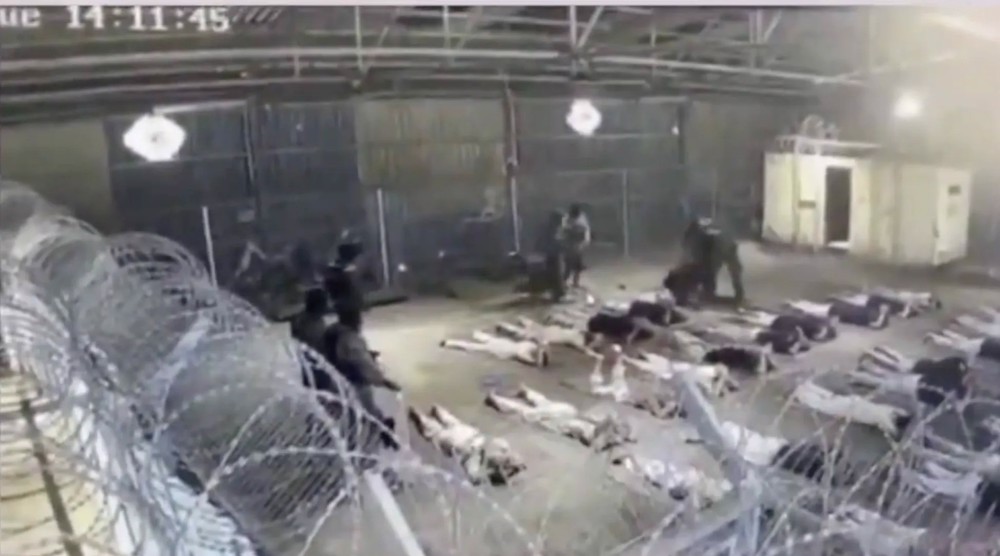By Alireza Akbari
Arrested at 13 by Israeli occupation forces, Ahmad Manasra walked free from an Israeli prison last week at 23, bearing physical and psychological scars of nearly a decade in incarceration.
Manasra’s release sparked both relief and renewed outrage over the prosecution of Palestinian children by Israeli military courts, amid the record number of Palestinian children held in Israeli jails.
Alongside Manasra, several other Palestinians were also freed, all of them bearing visible signs of torture, bearing testimony to inhumane conditions in Israeli military prisons.
It reignited concerns among human rights activists, who sounded a fresh alarm about the severe psychological toll and physical abuse that Palestinian children continue to endure behind bars.
Mansara’s arbitrary arrest in October 2015 came after he was falsely accused of stabbing and injuring two Israeli settlers in occupied East Jerusalem.
However, after a series of hearings and accompanying investigations, it was determined that Manasra had no involvement in the attack. Despite this, in 2016, he was still convicted of attempted murder.
The case raised serious questions, particularly since Mansara was under the age of criminal responsibility when he was incarcerated on flimsy charges.
For years, the teenage boy languished in solitary confinement, particularly in the notorious isolation section of Eishel prison in the Negev desert, according to available evidence.
His time there took a heavy toll on him, as the brutal interrogations, conducted without informing his parents or legal representatives, left him with severe psychological trauma.
After his release last week, following nearly a decade of imprisonment, the initial joy quickly gave way to the tragic reality of Mansara’s story as he appeared feeble and lost.
Social media platforms were flooded with harrowing accounts of his abduction, the brutal torture he endured in various notorious prisons, and the years he spent in isolation in Israeli jails.
The interrogation footage, in which he was denied the presence of legal counsel or his family, also went viral once more after his release.
“What were you doing?” an Israeli regime officer asked him during the interrogation. “I don’t remember. I swear by God, I swear,” Ahmad answered, his hand held up in a gesture of sincerity.
The officer responded: “Oh, you don’t remember, huh? And you swear by God? Who is this God?”
“I said all you’re saying is true, what more do you want? But I don’t answer any more than this, everything is true, but I don’t remember it,” Ahmad, seated alone in the chair, retorted.
His long-awaited freedom did not come at the gates of Nafha Prison, as his family had hoped, but in Bir as-Sabi’, a location far removed from his family’s reach.

Manasra’s story is not an isolated case. Hundreds of Palestinian children remain imprisoned in Israeli occupation jails under similarly inhumane conditions, robbing them of their childhood, according to various human rights groups.
Over the past two decades, the Israeli regime has abducted an estimated 10,000 Palestinian children in administrative detention, according to UN data. Unofficial data is much higher, though.
According to Save the Children, Palestinian children are “the only children in the world who are systematically prosecuted in (Israeli) military courts.”
The global humanitarian organization for children further highlighted the brutal treatment these children endure and noted that 86 percent of the Palestinian children in Israeli prisons are beaten, 69 percent are subjected to humiliating strip searches, and 42 percent suffer injuries during their arrests.
The Israeli forces’ detention campaigns have intensified in recent years, particularly after October 2023, coinciding with the ongoing Israeli genocidal campaign in the Gaza Strip.
A statement by Defence for Children International (DCI), an NGO in consultative status with the UN Economic and Social Council, also shed light on the long history of Israeli military detentions.
Since Israel’s occupation of Palestinian territories in 1967, Palestinians—children included—have been tried in Israeli military courts in violation of international humanitarian laws.
According to UN estimates, over 700,000 Palestinians have been detained since the occupation began, with children making up a significant portion of that number.
Each year, approximately 500 to 700 Palestinian children from the occupied West Bank face prosecution in these military courts, the majority of whom are Palestinian boys aged 15 to 17.

Arrested, interrogated, and detained by the Israeli military and police, these children are caught in a legal system that offers no protection and justice, according to rights activists.
Since 2,000, approximately 7,500 Palestinian children have been detained and prosecuted in Israeli military courts, as per conservative estimates.
This figure marks an all-time high since Defence for Children International (DCIP) began monitoring child administrative detainees in 2008, with these detainees now representing more than a third of Palestinian child prisoners.
Nearly all these detentions occurred after the events of October 7, 2023, as Israeli occupation forces ramped up their acts of aggression across the occupied West Bank.
“Detaining children indefinitely, without charge or trial, amounts to arbitrary detention,” said Ayed Abu Eqtaish, accountability program director at DCIP.
“Since October 7, Israeli forces have accelerated their arrest campaigns against Palestinian children and detained a record number of children without charge.”
According to the Israel Prison Service, more than one in three Palestinian child detainees are held under so-called administrative detention orders—a practice that has drawn international criticism for its lack of due process.
Reports indicate that the number of Palestinian children detained without charge is nearly five times higher than before October 2023.
Some children have been released as part of a truce agreement between the Gaza-based resistance movement Hamas and Israel, though many of these children were held in administrative detention.
DCIP’s documentation reveals a disturbing trend where Palestinian child detainees have consistently reported an increase in ill-treatment and torture, with prison conditions deteriorating sharply.
Administrative detention—a controversial practice in which individuals, including children, are imprisoned without charge or trial—has been a key tool in Israel’s crackdown on Palestinians.
Palestinian children held under administrative detention orders face a grim reality. They are held without being presented with charges, and the evidence used against them remains hidden.

This secretive process, which denies children and their attorneys access to the so-called evidence, makes it virtually impossible to mount a legal challenge to their detention or its supposed justification, according to documentation collected by Defence for Children International (DCIP).
This practice stands in stark violation of international juvenile justice standards, which Israel has committed to by ratifying the UN Convention on the Rights of the Child in 1991.
The Convention demands that children should only be deprived of their liberty as a last resort and must not face arbitrary or unlawful detention.
Reports of torture and other forms of cruel, inhuman, or degrading treatment continue to emerge from Israeli prisons, with Palestinian detainees bearing the brunt of the mistreatment.
DCIP’s documentation sheds light on the harrowing realities faced by children in Israeli jails, particularly the violent manner in which they are arrested.
Children are frequently taken from their homes at night by heavily armed soldiers, who subject them to painful restraints and blindfolds before transporting them to interrogation and detention centers.

In many instances, the interrogation and detention centers where Palestinian children are held are located within Israeli settlements—areas deemed illegal under international law.
The arrest and transfer of these children is often shrouded in secrecy, with neither the child nor their parents informed of the charges or the destination of the transfer.
This lack of transparency is compounded by a pattern of both physical and verbal abuse, making the process all the more harrowing, according to human rights watchdogs.
Once at the interrogation and detention center, children are typically questioned alone, without the support of a lawyer or family member. There is often no audio or visual recording of the interrogation, leaving little room for independent oversight.
The atmosphere in these centers is one of intimidation and fear, where children are routinely threatened and physically assaulted, say rights activists.
Such practices not only violate international law but also highlight the systemic abuse Palestinian children face within Israeli detention. Common reports include beatings, kicking, threats to both the children and their families, and exposure to the harsh elements.
Some children are held in solitary confinement, often in windowless cells with only a dim yellow light burning 24 hours a day, a form of psychological torment that can stretch for extended periods.
One such case was shared by Rashid S., an 11-year-old boy who was arrested by Israeli border police for allegedly throwing stones.

“They threw a stun grenade at me, and then put me in a chokehold,” Rashid was quoted as saying.
According to the military court’s most recent annual report, 99.74 percent of cases involving Palestinian children result in a conviction, with custodial sentences handed down in 98 percent of those cases.
This is in stark contrast to the Israeli civilian juvenile justice system, where only about 6.5 percent of children face custodial sentences, according to a report.
Once convicted, a significant number of these children (72 percent) are transferred to prisons and detention facilities inside the occupied territories, a clear violation of Article 76 of the Fourth Geneva Convention, which prohibits the transfer of detainees from occupied territories.
This systematic practice underscores the continuing cycle of injustice faced by Palestinian children in Israeli military courts and prisons.
The violation of Palestinian children’s rights in Israeli detention goes beyond physical abuse. Due to the lengthy process of obtaining permits, or the frequent denial of those permits for vague “security” reasons, many children are left without contact with their families.

Palestinian children are also barred from using the telephone or sending and receiving letters while in jails, further isolating them during what is already a deeply traumatic experience, as per confessions of Palestinians released from Israeli occupation jails.
The very nature of military courts, where these children are tried, raises serious concerns, too. These courts fail to meet even the most basic standards of a fair trial and juvenile justice, denying children the legal protections they are entitled to under international law.
Article 14 of the International Covenant on Civil and Political Rights, ratified by the Israeli regime in 1991, mandates that court procedures take into account the age of child defendants and the need to focus on their rehabilitation.
This is reinforced by the Convention on the Rights of the Child, also ratified by the regime in 1991, which ensures that children are “not compelled … to confess guilt.”
Furthermore, the committee tasked with interpreting the Convention has explicitly stated that children have the right to request the presence of a parent or guardian during questioning.
The absence of a parent or lawyer must be considered by judges when evaluating the reliability of a child’s confession.
Watch NBS news on YouTube in Bengali । Subscribe Our YouTube Channel: